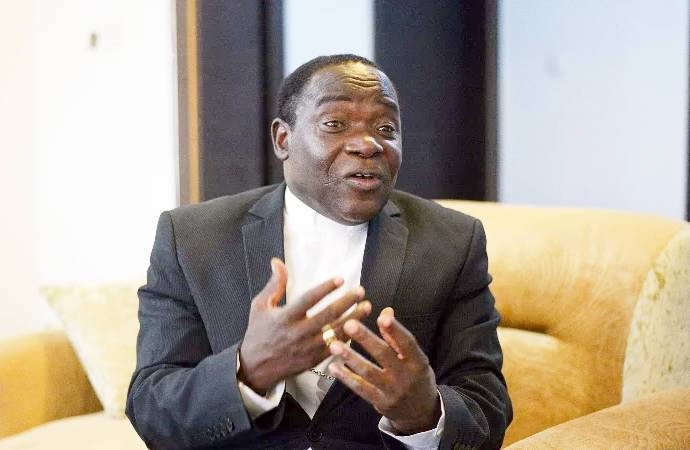Kukah centre urges churches to participate in politics, promote democracy
Director, Kukah Centre, Father Atta Barkindo, has called on churches in the country to actively participate in politics to promote democracy, peace, and development. Barkindo made the call on Wednesday while presenting a paper at the Third Theology Week of Good Shepherd Seminary in Kaduna and urged them to regenerate the missionary spirit, promote dialogue […]

Bishop Matthew Kukah
Director, Kukah Centre, Father Atta Barkindo, has called on churches in the country to actively participate in politics to promote democracy, peace, and development.
Barkindo made the call on Wednesday while presenting a paper at the Third Theology Week of Good Shepherd Seminary in Kaduna and urged them to regenerate the missionary spirit, promote dialogue and education in the country.
According to Barkindo, achieving peace and development in Nigeria goes beyond promoting nationalism, patriotism and national unity.
He lamented that conflicts witnessed in Nigeria have destroyed the foundation of nationhood and deepened the culture of impunity and a complete lack of accountability.
- Prosecution of corruption cases: ICPC chairman vows to appear in courts
- Bayelsa cancels teachers’ recruitment exams over malpractices
To address the challenges and drive peace and development, Barkindo emphasised the need to enthrone the rule of law, accountability, end the culture of impunity, promote common citizenship and manage diversity.
“To achieve this, the Church and her theologians have a role to play. We must also teach our lay faithful to actively participate in politics to promote democracy,” Barkindo stated.
He said, “The driving force of democracy is that it presents us with the best instruments for managing our diversity, creating inclusiveness, and breaking down the boundaries of exclusion. We must be at the table and be part of the decision-making process to enhance a pluralistic society.”
Barkindo emphasised that the Church must return to being the church for the poor and the underprivileged.
He added that missionaries must read, understand, and appreciate the context of societies they serve, including the historical, cultural, and linguistic situation of the people while serving them from within and supporting them in their struggles.
In discussing the need for a change of strategy in inter-religious dialogue, Barkindo highlighted the importance of studying and conducting such dialogues.
Magaji Ibrahim, a Senior Advocate of Nigeria (SAN), also presented a paper, stating that Nigeria since independence is still confused with many internal and external issues to governance and leadership.
Ibrahim lamented that issues faced by Nigeria, such as ethnicity, minority complaints, violence, and growing corruption, were often swept under the carpet.
He also highlighted the existence of mutual suspicion and ethnic jingoism, which have deprived Nigerians of all sense of reasoning as a people.
